William Dodd, the Macaroni Parson
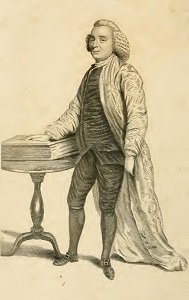
William Dodd was born in 1729 in the town of Bourne in Lincolnshire, which was in the 18th century a sleepy country town. His father was the local vicar and he seems to have done his best to prepare his son to follow him into the Anglican Church. At the age of 16 he was accepted at Clare College [1] in Cambridge, one of the oldest and most prestigious universities in England. He had literary ambitions, and had several pieces published while he was studying. In 1750 he graduated, achieving first-class honours in the mathematics class (which, in Cambridge, meant that he received the title of “wrangler”). Flushed with academic success, and with his eyes fixed on literary glory, he headed to London.
Once there he soon found that literary glory was a hard thing to grasp. While William did write reasonably well, and he made friends very easily with the literary set, he lacked the creative spark that would give him the kind of success he dreamed of. Still he persevered for a while, producing such works as a mocking version of the the typically idyllic pastoral called The Parsons, about the difficulties the country priest faced in being forced to collect the tithes they were due . A welcome application of “writing what you know”, but hardly calculated to excite the interests of the London masses. He wrote several poems about two African children that had been freed from slavery by the Earl of Halifax in a blatant attempt to secure the Earl’s patronage that failed miserably. He also produced one book (a volume published anonymously and mocking the editor William Warburton, as was apparently fashionable at the time) as well as two plays, both now lost.
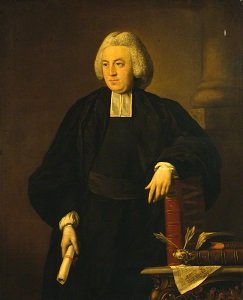
In 1751 he married the sixteen year old Mary Perkins, who it was rumoured was a former mistress of the Earl of Sandwich. [2] She was the daughter of a servant, and far below his station, which caused enough of a scandal that his father felt obliged to get involved. He dispatched his son back to Cambridge and had him take holy orders, before establishing him in a “living” (that is, in charge of a church with the income in tithes it generated) in West Ham. The following year, in 1752, William achieved his greatest financial success with a new invention – the index. His The Beauties of Shakespear (sic) extracted his favourite speeches from the plays of Shakespeare, and then added an index of subjects referring the reader to the relevant speeches on that subject. It was a simple but revolutionary idea, and as a result his book was reprinted six times in the 18th century and a further twenty-two times in the nineteenth – even receiving four twentieth-century printings. Moreover this method of delivering Shakespeare to the masses was wildly successful, and Goethe is said to have first read Shakespeare in William’s Beauties.
William’s preaching was popular as well, establishing him as a leading light in London. In 1758 he became involved with the Magdalen Hospital for “fallen women”, a charitable venture which greatly enhanced his standing in the city. As a result in 1763 he was appointed one of the King’s “Chaplains in Ordinary”, one of those who said mass for the Royal Family. He was also one of several tutors of the young Philip Stanhope, who was adopted by his godfather the Earl of Chesterfield and trained to succeed him in order to prevent the title dying out. In 1766 he had an unexpected windfall – not only did his wife inherit an annual income of £1500, but he won £1000 in a lottery. He invested the money in opening Charlotte Chapel in Pimlico (named after the Queen), which attracted the upper crust for their weekly worship. He dressed to match his prestige – he was known for his fashionable attire, and gained the nickname of the “macaroni pastor”. [3] He turned his talents for poetry to writing flattering verses to the wives of his patrons, and became a regular at civic events. Life was good for the Macaroni Pastor. And then in 1774 it all came unstuck.
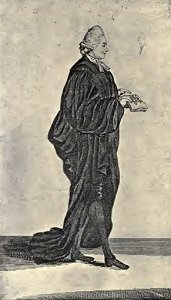
The problem was William’s extravagance. His income was far higher than the average priest, but nowhere near enough to keep up with the lifestyle he enjoyed. He ran up debts, though not enough to cause a major scandal. But it was enough to make his wife, born into relative poverty, nervous. So when the opportunity came up for William to secure the living of St George’s in Hanover Square (worth £1,500 in tithes) she wrote a letter to Lady Apsley, wife of Henry Bathurst, the Lord Chancellor. In it she anonymously offered £3,000 in cash and a third of the church’s income if William was granted the living. However she had seriously misjudged her mark. Lady Apsley showed the letter to her husband, and he made it public knowledge. The letter was traced back to the Dodds’ house, and the scandal ruined William’s reputation. He was struck off the list of Royal Chaplains, and was forced to go and live on the continent until the scandal died down.
William stayed with his old pupil Philip Stanhope (who had inherited the title of Lord Chesterfield) in Geneva for a while, but he soon returned to London. With his influence gone however, his creditors began to demand payment. He was forced to sell Charlotte Chapel, which helped in the short term but in the long term reduced his income even further. Finally in February 1777 he decided on a foolish gamble. He forged a bond for £4,200 in the name of Lord Chesterfield, claiming to a broker named Robertson that the young lord needed to discreetly raise some capital. The hint of scandal, combined with his own known friendship with Lord Chesterfield, was enough to have the bond accepted. At least, initially. Unfortunately for William there was a blot on the parchment, and so the when the lender gave the bond to his solicitor, they decided to write out a fresh copy. They presented the rewritten bond to Lord Chesterfield, and he denounced it as a forgery. (Whether he knew William had forged it is unclear.) Both William and Robertson were arrested.
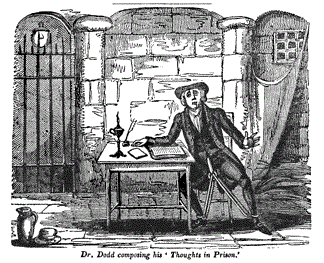
William made a full confession (clearing Robertson) and repaid the £3000 he had not used to settle his debts. He also made arrangements to have the rest of the money repaid, and it seemed that could all be settled amicably. Unfortunately for William, the Lord Mayor decided to insist that he be put on trial. Even more unfortunately, the crime of forgery carried a mandatory death penalty. Though William pleaded innocence on the grounds that he had made arrangements to repay the money owed, and that Lord Chesterfield had no wish to press charges, the jury were forced to find him guilty. Though they strongly recommended leniency, the judge had no option but to pass a sentence of death.
Due to legal wrangling by his lawyer, William was able to delay official sentencing until May. In the intervening three months, a petition to grant him a pardon gained 23,000 signatures. Despite his scandalous behaviour (or perhaps because of it) the Macaroni Pastor was still fondly remembered in the capital. Even the great Doctor Samuel Johnson (England’s foremost literary man at the time) came to his defence, though the two had never been friends. In the meantime William wrote, producing a long poem called Thoughts In Prison that many considered his best work. He also gave a famous sermon The Convict’s Address to his unhappy Brethren. There were rumours that Johnson had written it for him, which he confirmed many years later. At the time, he simply remarked when asked about the quality of the speech:
Depend upon it Sir, when a man knows he is to be hanged in a fortnight, it concentrates his mind wonderfully.
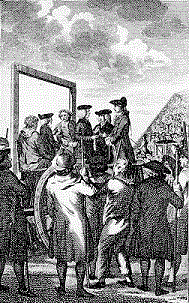
And to be hanged William was, as the King refused to give a royal pardon. Some believe this was due to a well known miscarriage of justice the previous year, where two brothers had been hanged for a forgery that it transpired one of the pair’s wife had committed. As the king had not given a pardon in that case, he could not give one in this without accusations of favouritism for his former chaplain. So he put royal dignity ahead of William Dodd’s life, and so the sentence was carried out on the 27th June 1777. One story is that while his friends had bribed the executioner to cut him down early in the hope that they could revive him, the crowd who mobbed the gallows to protest against his death prevented them retrieving his body in time. One last stroke of bad luck for the man who had risen so far, from his sleepy country town.
Images via wikimedia and From Bedroom To Study except where noted.
[1] Which was known as Clare Hall at the time, but which should not be confused with the modern Clare Hall. The modern Clare Hall was founded in 1966 by Clare College as an institute for post-graduate studies. This is actually pretty straightforward by Cambridge’s standards.
[2] The Earl was a notable member of the first Hellfire Club.
[3] “Macaroni” in this case means “fashionable”. This came from the Macaroni Club, which was established by young nobles who had gone on the “grand tour” of Europe, and attained a taste for the food in Italy. By association, “Macaroni” came to mean the equivalent of the modern “cool” – hence the lyrics to Yankee Doodle – “he stuck a feather in his cap, and called it Macaroni”.
